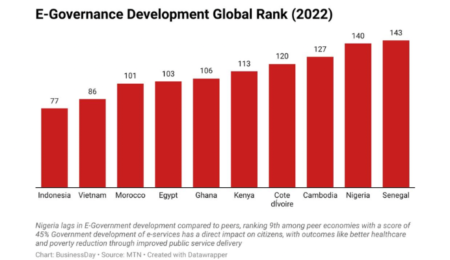Mike Rosanje, Co-founder/CEO at Cashbuddy, a .financial technology company and one of the pioneers of virtual dollar cards for the Nigerian market, in this interview with BusinessDay’s Chinwe Michael, speaks on the impact of unified exchange rate on virtual card operations in Nigeria.
The unified exchange rate policy by the central bank of Nigeria (CBN) that allows for commercial banks and dealers in the forex market to sell FX freely at a market-determined rate impact the cost of virtual card transactions for fintech in Nigeria.?
The unified exchange rate policy allows commercial banks and forex market dealers the freedom to sell foreign exchange (FX) at rates determined by the market. While this move aims to enhance transparency and efficiency, However, Nigerian fintech companies offering virtual card transactions may face both opportunities and challenges.
On the positive side, the policy brings potential benefits for us and other fintech firms. Firstly, increased foreign currency availability ensures a constant supply of funds required for virtual card transactions, thereby preventing delays and transaction failures. Secondly, a market-determined exchange rate, reflecting the true value of the naira, can lower transaction costs for overseas transactions, benefiting fintech businesses and their customers. Lastly, the transparency provided by market-driven exchange rates enables fintech companies to better estimate costs and schedule transactions, enhancing efficiency.
However, challenges have also emerged since the announcement of the new policy. Exchange rate volatility poses a risk as rates fluctuate in a market-driven system, introducing uncertainty and potential profit and loss implications. Limited access to foreign exchange could hinder fintech companies’ ability to obtain necessary currencies for virtual card transactions. Moreover, the transition to the new system may require fintech companies to adjust their processes, temporarily impacting efficiency.
The impact of the unified exchange rate policy on virtual card transactions will depend on how effectively fintech firms can leverage the benefits while mitigating the risks inherent in a market-driven system.
With the presence of numerous competitors, how will the unified exchange rate policy affect the competitiveness of virtual card providers in the Nigerian market?
One of the primary outcomes of the CBN’s flexible rate policy is its potential impact on the pricing competitiveness of virtual card providers. With the market-determined exchange rate reflecting the true value of the Nigerian currency, virtual card transactions can benefit from more favorable exchange rates. This, in turn, allows providers like us to offer competitive pricing, attracting a larger customer base and strengthening their position in the market.
Read also: 200 women entrepreneurs to get technology training to boost wealth creation
Moreover, the policy has the potential to enhance cost efficiency for virtual card providers. Reduced transaction costs associated with the unified exchange rate can enable providers to operate more cost-effectively. This newfound efficiency can be channeled into competitive pricing, promotions, or the introduction of additional features, giving virtual card providers a distinct advantage over their rivals.
Successful adaptation to the market changes resulting from the Naira float policy is another critical factor. Virtual card providers that can swiftly and effectively align their systems and processes with the new policy stand to gain a competitive advantage. Agility and adaptability will be paramount in this evolving landscape.
Furthermore, risk management strategies will play a vital role in the competitiveness of virtual card providers. The potential for exchange rate volatility necessitates robust risk management practices. Providers offering stability and reliability amid market fluctuations will be highly attractive to customers seeking a seamless experience and minimise transaction costs.
As the unified exchange rate policy reshapes Nigeria’s foreign exchange market, Cashbuddy is poised to seize opportunities for growth and gain a competitive edge. By leveraging favorable exchange rates, optimising cost efficiency, ensuring access to foreign currency, adapting swiftly to market changes, and implementing robust risk management, virtual card providers can position themselves as leaders in this dynamic sector.
As a virtual card service provider, will the costs of acquiring and transferring foreign currencies vary or remain the same under the new CBN policy?
The costs of acquiring and transferring foreign currencies for a virtual card service provider would undoubtedly vary compared to the previous policy.
The impact on these costs will hinge upon various factors, including exchange rate dynamics, market conditions, and the specific arrangements between providers and foreign exchange suppliers.
Under a market-determined exchange rate, where the true value of the Nigerian currency is reflected, virtual card service providers stand to benefit from a more transparent and competitive foreign exchange market. This scenario could potentially grant providers access to foreign currencies at rates that closely align with market standards, resulting in reduced costs for acquiring and transferring these currencies.
However, the introduction of a market-driven exchange rate system also introduces a new challenge – increased exchange rate volatility. Fluctuations in exchange rates bring uncertainty and risk for virtual card service providers. In response, providers may need to implement risk management strategies or employ hedging mechanisms to mitigate the potential impact of these fluctuations. These risk management measures may come with additional costs, such as fees for hedging services or currency risk assessment tools.
Are there any legal or regulatory implications for virtual card operators in Nigeria resulting from the implementation of a unified exchange rate policy?
In light of Nigeria’s implementation of a flexible rate policy, virtual card operators face legal and regulatory implications that could reshape the market landscape. With banks making a strong comeback, startups dominating the virtual dollar card market may struggle to comply with potentially stringent regulations, leading to a decrease in their numbers and an increase in banks’ market share. Considerations include compliance with exchange control regulations, licensing and authorisation requirements, adherence to anti-money laundering regulations, impact on transaction costs and pricing, and staying updated with regulatory changes. Virtual card operators are urged to seek legal and regulatory guidance to ensure compliance with the evolving Nigerian regulatory environment.






